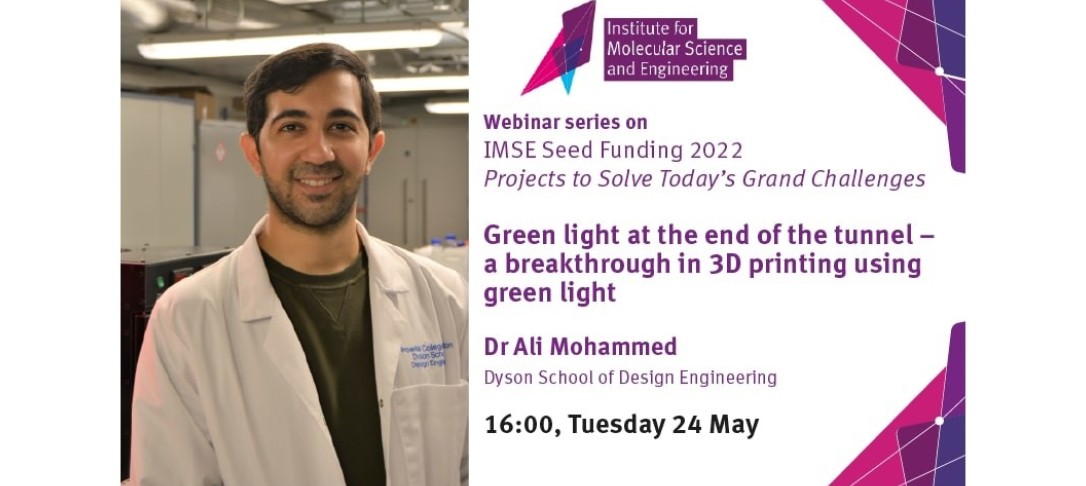
This webinar will be held on zoom. The structure of the event will be a presentation followed by audience Q&A. Please register to be sent the joining instructions. You can pre-submit questions for the Q&A section when registering.
This webinar is part of the series
IMSE Seed-funding 2022 – Projects to Solve Today’s Grand Challenges
Find our more about the IMSE seed funded projects here: https://www.imperial.ac.uk/news/235296/funding-interdisciplinary-projects-solve-todays-grand/
The theme discussed in this webinar will be:
Green light at the end of the tunnel – a breakthrough in 3D printing using green light
Abstract
Advances in 3D printing have allowed for rapid customisation and prototyping of complex designs. However, bio 3D printing in the presence of cells and micro-organisms is limited to syringe extrusion techniques that offer low print resolution and cell survival rates due to needle diameter and associated shear stresses. Print complexity using bio extrusion is also limited due to the rheology of the materials, which must be low enough to be extruded then rapidly cured to form a robust structure to support the next layer. Alternative 3D printing technologies which are capable of building more complex structures cannot include cells during the print process as these employ high-energy light sources (SLS) or cytotoxic wavelengths (SLA), killing living organisms embedded in the print material. Therefore, cells are attached after fabrication, adding significant time for cell colonisation and limiting cell integration into the material. Our team has developed a novel printing technology that aims to tackle these issues using light in the visible spectrum. Green light has a wavelength of 510 nm and has less energy making it less harmful to cells and microorganisms, making it a strong candidate for in-situ light based 3D bio printing. Here, we propose the development of a first of its kind green light digital light processing printer (g-DLP) to overcome obstacles in light-based bioprinting. This project aims to utilise an in-house developed g-DLP printer to construct stable, geometric bio-hydrogels. This breakthrough will overcome key limitations in 3D microorganism cultivation, by allowing, for the first time, rapid and precise biocompatible printing of living cells that have been embedded in a photo-curable resin prior to 3D printing. We aim to demonstrate that this new green light system is capable of 3D printing hydrogels and living cells together using the photosynthetic unicellular algae ‘Chlamydomonas Reinhardtii’.
Biography
Dr Ali Mohammed
Faculty of Engineering, Dyson School of Design Engineering, Research Associate
Dr Ali Mohammed is a research associate at the Dyson School of Design Engineering and part of the Advanced Manufacturing Group at Imperial College, working under Dr Connor Myant. Ali completed his bachelors in Chemical Engineering (BEng) at UCL in 2009. After which, he worked as a Process Technologist for 3 years at Royal Dutch Shells’ largest Gas To Liquid (GTL) plant to date, based in Ras Laffan (Qatar). There, he helped successfully and safely commission the plant to see it through to its first production of GTL fuel. He was awarded a Special Recognition Award by Shell in 2010 for his efforts. in 2013, he completed his MSc in Biomedical Engineering at Imperial College, with a project supervised by Prof Julian Jones in the Biomaterials Group. He continued onto his PhD in the Jones’ Group, and graduated in 2018. His research was based on advanced nanocomposite double network hydrogels for cartilage repair. Upon graduation, he was awarded the Larry Hench Prize for Excellence in Biomaterials Research. During his PhD, Ali also completed an associate degree at Harvard Medical School where he focussed on Cancer Biology Therapeutics. His has research experience in tissue engineering and biomaterial synthesis, polymer chemistry, cancer biology, and additive manufacturing. His research interests include novel materials and enhancing 3D printing technologies.
About The Institute for Molecular Science and Engineering
The Institute for Molecular Science and Engineering (IMSE) is one of Imperial College London’s Global Institutes, drawing on the strength of its four faculties to address some of the grand challenges facing the world today. The Institute’s activities are focused on tackling problems where molecular innovation plays an important role.
If you have any questions about accessibility requirements please email Leah Adamson (IMSE Events Officer) on l.adamson@imperial.ac.uk


